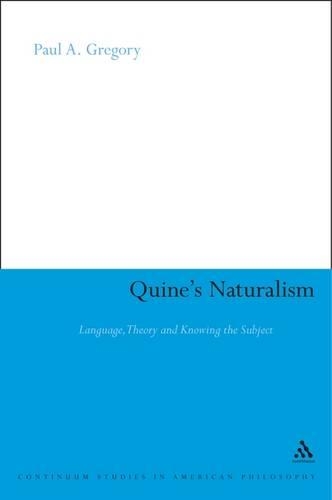
Quine's Naturalism: Language, Theory and the Knowing Subject
(Paperback, NIPPOD)
Available Formats
Publishing Details
Quine's Naturalism: Language, Theory and the Knowing Subject
By (Author) Paul A. Gregory
Continuum Publishing Corporation
Continuum Publishing Corporation
3rd November 2011
NIPPOD
United States
Classifications
Professional and Scholarly
Non Fiction
Western philosophy from c 1800
146.4
Physical Properties
Paperback
156
Width 156mm, Height 234mm
Description
W. V. Quine was the most important naturalistic philosopher of the twentieth century and a major impetus for the recent resurgence of the view that empirical science is our best avenue to knowledge. His views, however, have not been well understood. Critics charge that Quine's naturalized epistemology is circular and that it cannot be normative. Yet, such criticisms stem from a cluster of fundamental traditional assumptions regarding language, theory, and the knowing subject the very presuppositions that Quine is at pains to reject. Through investigation of Quine's views regarding language, knowledge, and reality, the author offers a new interpretation of Quine's naturalism. The naturalism/anti-naturalism debate can be advanced only by acknowledging and critiquing the substantial theoretical commitments implicit in the traditional view.
Gregory argues that the responses to the circularity and non-normativity objections do just that. His analysis further reveals that Quine's departure from the tradition penetrates the conception of the knowing subject, and he thus offers a new and engaging defence of Quine's naturalism.
Reviews
'A useful book ... illuminating.' - International Studies in the Philosophy of Science
'Paul Gregory has written a wonderfully clear and useful book on Quine's naturalistic epistemology. Gregory does a fine job of explaining central Quinean doctrines and their interrelationship, as well as providing an illuminating defense of these views against various objections.' Professor Hilary Kornblith, University of Massachusetts Amherst, USA
Mention -Chronicle of Higher Education, February 27, 2009
'An important contribution to the ongoing debate over philosophical naturalism. Gregory carefully articulates and answers the main objections that have been raised against Quine ... The book brings out very clearly the power of Quine's attack on traditional epistemology, and also the connections between Quine's epistemological tradition and of the classical analytic philosophers in the background of Quine's work. This clearly and engagingly written work casts important new light on Quine's contributions to the theory of knowledge, and to the development of contemporary naturalism.' Matthew Moore, CUNY * Blurb from reviewer *
"the historical figure as he or she really was. In this I believe Gregory, with his firm command of a wide range of Quinean texts, and his close attention to implicit connections, has succeeded remarkably well." - Notre Dame Philosophical Review -- John P. Burgess * Notre Dame Philosophical Reviews *
Author Bio
Paul A. Gregory is an Assistant Professor in Philosophy at Washington and Lee University, Virginia, USA.
